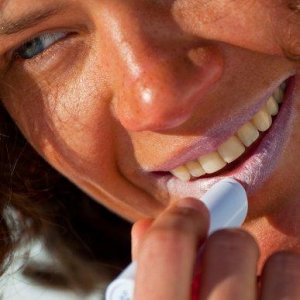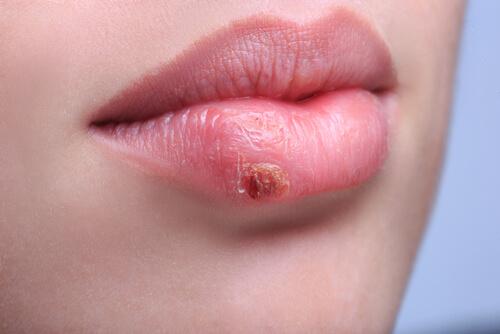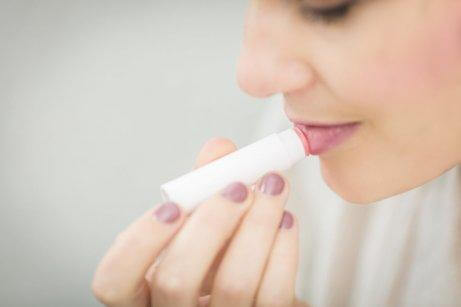Six Tips to Protect Your Lips from the Sun

The outer layer of skin of your lips is thin, which it’s why it’s not adequately protected against UV rays. This area barely has any melanin, the natural skin pigment that could help protect your lips from the sun. As a result, they rarely tan but can burn easily.
Plus, because the lips are on the face, they’re almost never protected. Therefore, they’re constantly exposed to sun damage.
Did you know that licking your lips may be more harmful than helpful since saliva acts as a lens to intensify sun exposure?
Sun-Related Lip Damage
When the skin on your lips gets burned by the sun, it can lead to prolonged damage.
If your lips are unprotected and exposed to too much sun, the collagen can change. Thus, it’s likely that your lips will wrinkle and fine lines will form around your mouth. The damage even happens even when there are no physical signs of the effect of the sun.
Wrinkles and premature aging aren’t the only consequences of sun damage. Prolonged and unprotected sun exposure can also cause the development of actinic cheilitis, a precancerous condition sometimes known as ‘farmer’s lip’ or ‘sailor’s lip’.
People with this condition often complain of persistent lip dryness and cracking. They often exhibit other effects of sun-damaged skin, such as precancerous lesions and extensive wrinkles. It’s estimated that 3,500 new cases of skin cancer are diagnosed in the lips every year.

How to Protect Your Lips from the Sun
Dermatologists recommend using sunscreen products to care for your lips. It’s important to protect your lips at least half an hour before going outside.
As with body sunscreen, lip sunscreens should also be applied frequently during sun exposure. Now, we’re going to tell you how to protect them:
1. Use waterproof products
If you’re in the pool or on the beach, make sure the sunscreen you use for your lips is waterproof. It’s important that it provides protection even during very long swims (80 minutes or longer).
Lip sun protection comes off the fastest. For this reason, you should apply it as often as necessary during your time at the beach or pool.
2. PABA-free sunscreen
You should also look for a PABA-free sunscreen. This is because PABA can cause allergies in some people.
Photodermatitis can make the skin burn more easily in places where the PABA was applied. You can also develop a rash from it.
3. Check the SPF

As with body sunscreens, lip sunscreens also contain a certain sun protection factor (SPF). To protect your lips from the sun, choose an SPF 15 or higher lip balm.
Make sure that the product keeps your lips soft and moisturized. Remember that dryness increases burning in the area.
4. Don’t use lip glosses as substitutes
You’ve probably thought of applying lip gloss instead of a protective lip balm because it’s the first thing you have at hand. However, doing this only damages your lips.
Shiny lip glosses or lipsticks harm the skin of your lips as they can direct UV rays to the area. Also, choosing a lip gloss without SPF can increase your chances of developing skin cancer.
5. Exfoliate your lips

After sun exposure, you should gently exfoliate your lips if they’re dry and begin to peel. For this purpose, use some sugar and olive oil. This mixture helps to remove accumulated dead cells.
However, you must obviously take into account that, since it’s such a sensitive area, you shouldn’t exfoliate too hard nor mistreat your lips. In addition, you shouldn’t exfoliate right after sun exposure, since your lips will be more sensitive than usual.
Take a look at this article: How to Prevent and Treat Chapped Lips
6. Use products that lock moisture in
Buy a lip product made of beeswax, petroleum jelly, or paraffin. These substances are very gentle on the lips and will make them look better.
In addition, they’ll lock moisture in and stay on your lips for longer. This way, you can enjoy your summer walk without having to worry about applying a lip balm so often.
Make the most of your outdoor walks without forgetting that you must protect your lips from the sun. Remember that they also suffer from the harmful effects of UV rays. Thus, make sure to apply lip balm with sunscreen every day.
All cited sources were thoroughly reviewed by our team to ensure their quality, reliability, currency, and validity. The bibliography of this article was considered reliable and of academic or scientific accuracy.
- Cabello B Tania, Sazo B Nicolás, Salgado F Apolo, Martínez R Benjamín. Sobrevida en carcinoma espinocelular de labio. Rev. méd. Chile [Internet]. 2015 Jul [citado 2018 Nov 25] ; 143( 7 ): 847-855. Disponible en: https://scielo.conicyt.cl/scielo.php?script=sci_arttext&pid=S0034-98872015000700004&lng=es. http://dx.doi.org/10.4067/S0034-98872015000700004.
- Hernández Osorio Carolina, Fuentes Palma Bernardita, Cartes-Velásquez Ricardo. Queilitis actínica: aspectos histológicos, clínicos y epidemiológicos. Rev Cubana Estomatol [Internet]. 2016 Jun [citado 2018 Nov 25] ; 53( 2 ): 45-55. Disponible en: http://scielo.sld.cu/scielo.php?script=sci_arttext&pid=S0034-75072016000200008&lng=es.
- Orozco P, Vásquez S, Venegas B, Rivera C. Prevalencia de queilitis actínica en trabajadores expuestos a radiación ultravioleta en Talca, Chile. Rev. Clin. Periodoncia Implantol. Rehabil. Oral [Internet]. 2013 Dic [citado 2018 Nov 25] ; 6( 3 ): 127-129. Disponible en: https://scielo.conicyt.cl/scielo.php?script=sci_arttext&pid=S0719-01072013000300005&lng=es. http://dx.doi.org/10.4067/S0719-01072013000300005.
This text is provided for informational purposes only and does not replace consultation with a professional. If in doubt, consult your specialist.








